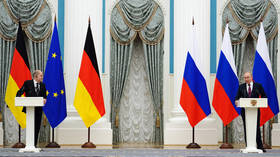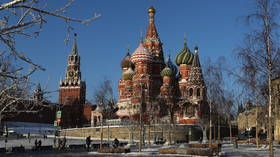Germany reacts to potential Russian recognition of Donbass republics

Moscow’s acknowledgment of the sovereignty of the two self-proclaimed republics in Ukraine’s Donbass region would be “a political disaster,” German Chancellor Olaf Scholz told Russian President Vladimir Putin during a press conference on Tuesday.
Speaking in Moscow, Scholz told his counterpart that recognition of the Lugansk and Donetsk People’s Republics would violate the terms of the Minsk agreements, two treaties signed in 2014 and 2015 with the goal of making a path for peace in the Donbass.
The Donetsk and Lugansk regions in the Donbass area of Ukraine broke with Kiev in 2014, following the events of the Maidan, when violent street protests toppled the democratically elected Ukrainian government. Ukraine believes Russia is supporting the two breakaway republics both financially and militarily. Putin, however, has repeatedly refused to recognize the republics as independent, instead calling on Kiev to give them special status inside Ukraine.
Chancellor Scholz’s warning comes after the Russian State Duma on Tuesday backed a motion, originally introduced by the Communist Party, calling for Kremlin recognition of the independence of the two entities. A total of 351 MPs backed the proposal – an overwhelming majority.
According to Scholz, this would constitute a severe breach of the 2015 Minsk agreements, which Germany helped mediate.
“If the parliament accepts the proposal and this becomes a reality, of course, this will mean a violation of the Minsk agreements… the process will be interrupted, and it will be a political disaster,” Scholz said, as quoted by Novaya Gazeta.
Despite parliament voting in favor of the motion, Putin has refused to immediately recognize the sovereignty of the two breakaway regions. The president has repeatedly stressed his preference for a diplomatic solution to the issue, and told Scholz that his decision would be based on the “capabilities for the implementation of the Minsk agreements.”













